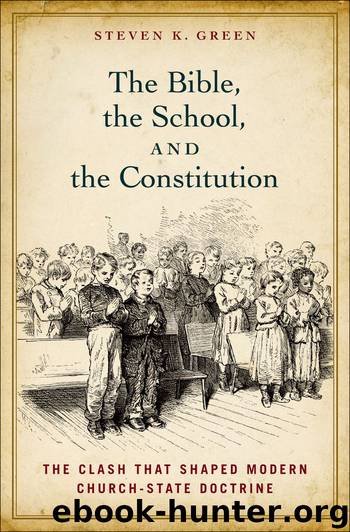The Bible, the School, and the Constitution:The Clash That Shaped Modern Church-State Doctrine by Steven K. Green

Author:Steven K. Green [Green, Steven K.]
Language: eng
Format: epub
Tags: Religion, Religion; Politics & State
ISBN: 9780199913459
Publisher: Oxford University Press
Published: 2012-01-04T07:18:28+00:00
The Defeat of the Christian Amendment
In the interim, conflicts over the School Question kept church-state matters in the public spotlight. People on both sides of the Christian Amendment paid close attention to the outcome of the Cincinnati case. Even before the Ohio Supreme Court ruling, the N.R.A. highlighted the case as further proof of the need for the amendment. Speaking in New York in April of 1872, David McAllister decried the efforts of “opponents of Christianity” who sought to remove the Bible from public schools. “[I]f we had in our national Constitution that acknowledgement we had in nearly every State constitution, it would not only sustain the decision of the Ohio [Superior Court] judge, but would greatly strengthen the friends of our Christian system of education. And it is the aim of the association to have that undeniably legal basis in our Constitution, so that there will never be any question raised about the matter, and so that when men stand up to resist the Bible we may say, ‘No; we recognize the Christian religion as a fundamental law of our Constitution.’” The Christian Amendment presented a solution to the School Question, or so McAllister claimed.50
Expectantly, the N.R.A. expressed outrage at the Ohio Supreme Court’s decision in February 1873 upholding the Bible’s removal from the Cincinnati schools. Aside from the holding, the Association objected to a passage in the court’s opinion that appeared to chastise their efforts at securing a constitutional amendment. Justice Welch had written that “Religion is not—much less Christianity or any other particular system of religion—named in the preamble to the Constitution of the United States as one of the declared objects of government … [or] as being essential to anything beyond mere human government.” Even worse, Welch’s sentiments had identified with the Liberals: “united with religion, government never rises above the merest despotism; and all history shows us that the more widely and completely they are separated, the better it is for both.” 51 David McAllister threw down a gauntlet. If the constitution prohibits Bible reading in the public schools, he wrote, then “instead of expelling the Bible from our common schools, to make them conform to the fundamental law, which acknowledges neither God nor the Bible, we shall insert the acknowledgement of God and His law in the Constitution, and make it conform to our common schools.” 52
In actuality, the Ohio holding was a godsend for the Association, as it provided another rallying cry for their amendment. McAllister asserted that the issue was not one of conscience rights of non-Protestants but the perpetuation of the nation’s moral structure. “The rights of society and of the nation [can] not, and must not, be passed over for the sake of granting individual requests … conforming to individual opinion or supposed rights.” Recasting the religious liberty issue at stake, McAllister argued that religious dissenters “seem to regard their wants of more importance than the nation’s rights, and [are] willing to crush out civil and religious liberty.” In essence,
Download
This site does not store any files on its server. We only index and link to content provided by other sites. Please contact the content providers to delete copyright contents if any and email us, we'll remove relevant links or contents immediately.
Objection! by Nancy Grace(1775)
Apeirogon by Colum McCann(1688)
Anatomy of Injustice by Raymond Bonner(1651)
That Every Man Be Armed by Stephen P. Halbrook(1574)
Civil Procedure (Aspen Casebooks) by Stephen C. Yeazell(1537)
The Vaccine Court by Rohde Wayne(1491)
Injustices by Ian Millhiser(1487)
Storytelling for Lawyers by Meyer Philip(1451)
A Practical Guide to International Arbitration in London by Hilary Heilbron(1422)
Restitution by Restitution(1422)
Coercing Virtue by Robert H. Bork(1353)
Broken Scales by Joel Cohen(1343)
Tangled Webs: How False Statements Are Undermining America: From Martha Stewart to Bernie Madoff by James B. Stewart(1328)
The Tools of Argument: How the Best Lawyers Think, Argue, and Win by Joel Trachtman(1300)
A Matter of Interpretation by Antonin Scalia(1297)
INDEFENSIBLE: One Lawyer's Journey Into the Inferno of American Justice by Feige David(1278)
American Tragedy by Lawrence Schiller & James Willwerth(1264)
Tangled Webs by James B. Stewart(1241)
A Religious Orgy in Tennessee by H.L. Mencken(1240)
